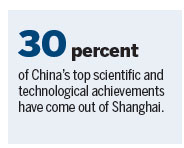Shanghai makes a sci-tech leap
Shanghai made a major breakthrough last year toward its goal of becoming an internationally influential science and technology innovation center, as an annual innovation index registered a record high of 224.9 points in 2016, according to a report released on Saturday.
The 2017 Shanghai Science and Technology Center Index report, released by the Shanghai Institute for Science of Science during the Pujiang Innovation Forum in Shanghai, which ends on Monday, has measured Shanghai's innovation quotient for seven years. The index uses a weighted formula that takes into account a number of developmental factors. An index value of 100 represents no change year-on-year.
Shanghai saw a fruitful 2016, the report said. About 30 percent of China's top science and technology achievements have come out of Shanghai. More than a third of the national-level awards have been won by people and institutions in the city, and more than 30 percent of new Category 1 drugs were produced there, it said.

The city has also seen an improvement in its ability to export technology and high-value-added products. The report said about 69 percent of technology contracts last year involved transfers to domestic and overseas companies.
A total of 729 technologies were transferred last year, with transaction volume reaching 20.3 billion yuan ($3.1 billion), up 9.7 percent year-on-year. About 90 percent of that went to Asia, North America and Europe. Electronic information, advanced manufacturing and advanced pharmaceutical industries registered the most transfers.
Automatic data processing equipment and components, and integrated circuits were the two leading exports from Shanghai in 2016, accounting for more than 20 percent of the city's total.
Investment in research and development reached 104.9 billion yuan in 2016, up 10 percent from a year earlier. However, companies in Shanghai only contributed 64.5 percent to the total R&D amount, which was significantly below the national average of 78 percent.
However, according to Chang Jing, deputy director of the innovation policy research office at the Shanghai Institute for Science of Science, the companies "have become more outbound, making direct investments in overseas markets in the science and technology sector".
Minister of Science and Technology Wan Gang said during his keynote speech at the Pujiang forum that investment in basic scientific research coming from companies in China is not yet adequate when compared with leading developed countries.
"It is basic scientific research that has provided strong support to mass innovation and entrepreneurship," he said.









